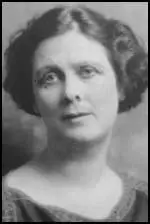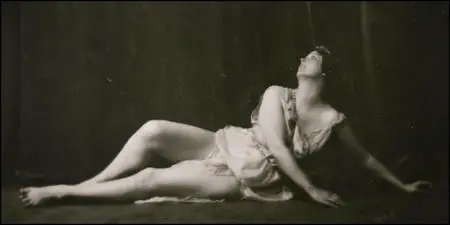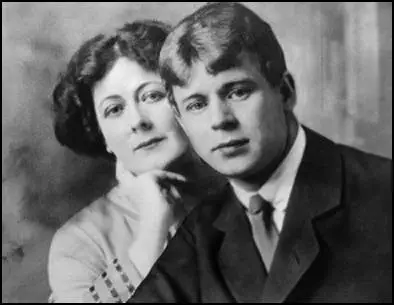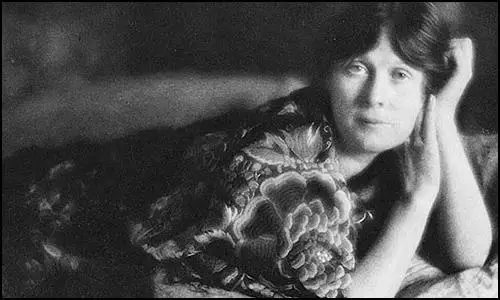Isadora Duncan

Angela Isadora Duncan, the daughter of Joseph Charles Duncan (1819–1898) and Mary Isadora Gray (1849–1922), was born in San Francisco, California, 27th May, 1877. Her father's business failed soon after her birth, and she was brought up in poverty. Isadora wrote that there was often nothing to eat in the house: "I was always the volunteer sent to the butcher, and who cleverly got the cutlets out of him without paying... I was the one sent to get credit out of the baker." Isadora's parents were divorced when she was a child.
Samuel Dickson has claimed: "Isadora was a quaint child, a strange mixture of practical common sense and worldly sophistication, and she was a dreamer like her father. The child loved poetry, beauty, and rhythm, and she hated reality. She was, in fact, a rebel. Her childhood had been an unhappy one. There was strife and divorce, with her mother's insistence that her father, Joseph, was a demon in human garb. Then there was her mother's disavowal of the religion in which she had been raised, and her espousal of the atheism of Robert Ingersoll. These were the unhealthy shapers of Isadora's childhood. Of course, when she eventually met her father, she found him a charming, lovable poet, and that heightened the confusion in her mind. Passing years tend to soften the intolerance of childhood, but Isadora Duncan never lost her contempt for the institution of marriage as she had seen it. When she was twelve years old she made a solemn vow that she would welcome love when it came, but she would never marry."
Isadora's mother moved the family to Oakland, where she established herself as a pianist and music teacher. She later described her life as being "shabby" and "thriftless". Her mother did find the money to pay for dance lessons. According to Isadora her teacher was "one of the most famous in San Francisco" but she did not like the steps he taught her "because they were ugly and against nature". She never went back and decided to teach herself to dance. After leaving school she gave dance classes to local children.
In 1895 Duncan became part of Augustin Daly's theater company in New York City. It has been pointed out by Jone Johnson Lewis: "Isadore Duncan's first public appearances in America made little impact on the public or critics, and so she left for England in 1899 with her family, including her sister, Elizabeth, her brother, Raymond, and her mother. There, she and Raymond studied Greek sculpture at the British Museum to inspire her dance style and costume - adopting the Greek tunic and dancing barefoot. She won over first private and then public audiences with her free movement and unusual costume (called "scanty," baring arms and legs). She began to dance in other European countries, becoming quite popular."
While in London she gave private performances in the homes of wealthy patrons. The money she earned from these engagements allowed her to rent a dance studio to develop her work and create larger performances for the stage. Walter Duranty, was a student when he saw her for the first time. He wrote in his autobiography, I Write As I Please (1933): "Of all the people I have known I think Isadora was the most picturesque. I saw her dance once in London while I was still in college, and ever afterwards the memory of her grace and beauty and slim, flashing limbs stayed with me as something rare and wonderful." Duranty later claimed "and ever afterwards the memory of her grace and beauty and slim, flashing limbs stayed with me as something rare and wonderful... a flame inside her whose brightness had nothing to do with her body."

In 1902 Isadora Duncan agreed to go on tour with Loie Fuller, creating new works using her innovative dance technique. In Paris her dancing was seen by the journalist, William Bolitho. He wrote in his book, Twelve Against the Gods (1929): "It is Isadora's resolute rejection of the ordinary hope and destiny of women, the legal support of a man, indeed, that spiritually entitles her life to be considered as an adventure.... To eke out her Nature, she borrowed and adopted the attitudes of Greek vases. She, the pure inspirationist, gradually constructed an intricate technique of her own." When she reached Germany she told a local impresario that she had "come to Europe to bring about a renaissance of religion by means of dancing."
Samuel Dickson has pointed out: "She danced in Paris and was cheered. she danced in Berlin, and the art-loving Germans went mad with enthusiasm. The artists and students of Munich idolized her. The story is told of the night that, unharnessing her horses, they dragged her carriage through the streets of Munich in a rain of flowers. They carried her into their cafe, lifted her onto a table, and she danced for them. Life was gorgeous. But always at the back of her persistent mind was her dream, Some day she would dance in the land of ancient culture where the Athenian maidens had made the dance a religion. Some day she would bring back the beauty of classical simplicity to the people of the nineteenth century. What if she did dance in scant veils that showed the honest beauty of her form? There could be no evil in honest beauty. Europe cheered her and virtuous old wives condemned her."
Duncan had a strong desire to pass on her philosophy of dance and in 1904 she opened a dance-school in Grünewald. Later, Duncan established schools in Paris and Moscow. She later claimed: “I spent long days and nights in the studio seeking that dance which might be the divine expression of the human spirit through the medium of the body’s movement.”
Duncan had a relationship with the theatre designer Gordon Craig, the son of Ellen Terry and the sister of Edith Craig. She recalled in her autobiography, My Life (1927): "Here stood before me brilliant youth, beauty, genius; and all the magnetic willingness of a temperament which had for two years lain dormant, but waiting to spring forth. Here I found an answering temperament, worthy of my metal. In him I had found the flesh of my flesh, the blood of my blood." Duncan gave birth to Craig's child, Deirdre on 24th September, 1906.
The father of her second child, Patrick (born 1st May, 1910), was Paris Singer, the son of sewing machine magnate Isaac Singer. Both children died in an accident on in Paris on 19th April, 1913. Walter Duranty claims that the death of her children completely changed her personality: "It was caused by the tragic death of her children in Paris when a taxi-driver drove them and their governess and himself suddenly into the Seine, because his steering gear went wrong on the corner of a bridge, and all of them were drowned. After that Isadora did not care much about anything." In her autobiography, My Life (1927) Duncan claims that after her children's death she embarked on an affair with the sculptor Romano Romanelli, in a desperate attempt to have more children. She did become pregnant after the deaths of her elder two children. She gave birth to a son, who lived only a few hours and was never named.
In 1921 Duncan met the Russian poet Sergei Yesenin. She was 44 and he was 26. They married the following year. Her old friend, Walter Duranty, thought she had made a terrible mistake: I was sitting with Isadora Duncan one evening in the Stable of Pegasus cafe when the poets were having a party; that is to say one after another got up on a little stage at the end of the room and recited his own verses. That, it seems, is the poet's ideal of a party. Essenin had been sitting there rather drunker and more offensive than usual, which was saying a good deal, and when he left us just before his turn I couldn't help asking Isadora why on earth she married that one." She replied: "He's not at his best tonight, poor Sergai but there's one thing I'd have you know, and it's this; that boy's a genius. All my lovers have been geniuses; it's the one thing upon which I insist."

Duncan and Yesenin went on a tour of Europe and the United States. Duranty claims that she was now "fat and lazy and drank to excess and did not much care whether she was ill-kempt or sloppy". It has been argued by Sally J. Taylor that the tour was a disaster: "After a flamboyant Western tour in the United States and Europe that left the reputation of both the poet and the dancer in tatters."
On 26th November 1923 Walter Duranty introduced Duncan to Alexandra Kollontai. "Isadora grew impatient and sent me out for a bottle of vodka, then she and Kollontai sat and talked about life and love and men and what they thought of them. Kollontai had fully as much experience as Isadora and had written some interesting books on relations between the sexes, from a highly modern and radical viewpoint.... Like the owl I sat tight and listened. I would give much for a stenographic report of that conversation, delivered at high tension by two past masters in the Art of which they spoke. To my sorrow the vodka on top of a hearty dinner was too much for my memory, but I know that I have rarely had an hour of greater entertainment, and I am certain that the transcript of their dialogue would have made a marvellous book."

Duncan's marriage to Sergei Yesenin broke down and they separated. In 1923 Yesenin had a son by the poet Nadezhda Volpin. Two years later he married his fourth wife, Sophia Andreyevna Tolstaya. He continued to suffer from depression and on 28th December 1925, he wrote a farewell poem in his own blood, then hanged himself in his room in the Angleterre Hotel in Leningrad.
On the night of 14th September, 1927, Isadora Duncan was a passenger in the Amilcar automobile driven by Benoît Falchetto in Nice. Her silk scarf, draped around her neck, became entangled around the open-spoked wheels and rear axle, breaking her neck.
Primary Sources
(1) Walter Duranty, I Write As I Please (1935)
I knew that she was fat and lazy and drank to excess and did not much care whether she was ill-kempt or sloppy, but I knew also that she had a hole in her heart which excused everything. In all human experience there is nothing so devastating as a hole in the heart, no matter what it comes from. In Isadora's case it was caused by the tragic death of her children in Paris when a taxi-driver drove them and their governess and himself suddenly into the Seine, because his steering gear went wrong on the corner of a bridge, and all of them were drowned. After that Isadora did not care much about anything. She told me so herself and I said, "Did you ever care much about anything?You're an artist, aren't you? What do artists care about anything ever?" Isadora said, "You're damn clever, Walter Duranty, and you're a damn fool. Can't you understand that there's all the difference between what you feel as an artist and what you care about as a person?"
(2) William Bolitho, Twelve Against the Gods (1929)
The naive sparrowishness of her claims on humanity, in step, changes into a more and more definite socialism. No doubt her adherence to Leninism was never very intellectual; still the flag-waving, the redtunicism, this was disagreeably nearer, by whatever the distance, the hysterical earnest of a woman with a cause, than to the exciting day-dreaming of the other Isadora. I find the account of her visit to Russia, her marriage to Esenin... more distressing than interesting ... Incident after incident, as set down by her dearest friends, makes us uneasy. She accepts the use of a flat belonging to an artist, a dancer (ballet, it is true), exiled from Moscow, and criticizes the furniture gleefully and without amenity. She goes to select a fur coat from the vast store of those commandeered from middle-class women, and is snubbed by the very official when she chooses one, thinking it was free of charge. The Communist conductor leads his orchestra out disdainfully when she reminds him she has sacrificed a great deal to come to "help the children of Russia."
(3) Walter Duranty, I Write As I Please (1935)
Life was pleasant in Moscow that summer (1924). I had come to know a number of poets and writers and artists, who used to meet in the evenings at a cafe on the Tverskaya opposite the Hotel Lux which bore the extravagant title of "Stable of Pegasus". It was a favourite haunt of Isadora Duncan - she had a school of dancing in Moscow at the time - who had just married what seemed to me an extremely worthless poet named Essenin. Of all the people I have known I think Isadora was the most picturesque. I saw her dance once in London while I was still in college, and ever afterwards the memory of her grace and beauty and slim, flashing limbs stayed with me as something rare and wonderful. Then I met her in Moscow, a stout middle-aged woman married to this pimply Essenin, and strange to say I was not disillusioned in the least, because Isadora had a flame inside her whose brightness had nothing to do with her body. I knew that she was fat and lazy and drank to excess and did not much care whether she was ill-kempt or sloppy, but I knew also that she had a hole in her heart which excused everything. In all human experience there is nothing so devastating as a hole in the heart, no matter what it comes from. In Isadora's case it was caused by the tragic death of her children in Paris when a taxi-driver drove them and their governess and himself suddenly into the Seine, because his steering gear went wrong on the corner of a bridge, and all of them were drowned. After that Isadora did not care much about anything. She told me so herself and I said, "Did you ever care much about anything anyway. You're an artist, aren't you? What do artists care about anything ever?" Isadora said, "You're damn clever, Walter Duranty, and you're a damn fool. Can't you understand that there's all the difference between what you feel as an artist and what you care about as a person?" Isadora was lonely in Moscow and I think she liked talking to me because she knew that I admired her terribly and thought her conversation wonderful.
One night in the autumn of 1923 I spent an hour in her dressing room at a theatre where she was going to dance with some of the children from her school. Kollontai, the first woman ever to be appointed Ambassador - she had served in Norway or Sweden, and Mexico - was there too. It was a ceremonial evening in honour of the Fifth Congress of the Women's Section of the Communist Party, and the preliminary speeches took more time than had been expected. Isadora grew impatient and sent me out for a bottle of vodka, then she and Kollontai sat and talked about life and love and men and what they thought of them. Kollontai had fully as much experience as Isadora and had written some interesting books on relations between the sexes, from a highly modern and radical viewpoint....
Like the owl I sat tight and listened. I would give much for a stenographic report of that conversation, delivered at high tension by two past masters in the Art of which they spoke. To my sorrow the vodka on top of a hearty dinner was too much for my memory, but I know that I have rarely had an hour of greater entertainment, and I am certain that the transcript of their dialogue would have made a marvellous book. I heard a story about Kollontai when I first went to Moscow which illustrates Lenin's humanity and sense of humour. In the early days of the Revolution she had a violent affair with Dybenko, the idol of the Red fleet, who had brought the cruiser Aurora up the Neva from Kronstadt to Petrograd, at the time of the Revolution in November 1917, to fire on the Winter Palace which was then the headquarters of the Provisional Government. He and Kollantai were so absorbed in each other that they forgot about the Revolution whose fate still hung in the balance, and rushed off to the Crimea for a honeymoon. This caused acrid comment amongst the Communist leaders, who were a puritanical lot, and finally the matter was brought up seriously in a meeting of the Central Committee. One speaker after another demanded the severest penalties against the erring couple for what they called "desertion in face of the enemy". It was soon clear that the meeting wanted to have them shot, no less. Then Lenin intervened. "I have listened, comrades," he said solemnly, "to your just and weighty remarks, with which I fully concur. No punishment can be too harsh for this unworthy pair; death itself is inadequate. I therefore suggest that we vote upon the following resolution: 'Sternly repudiating the behaviour of Comrades Kollontai and Dybenko the Central Committee of the Communist Party decides that they be punished in an exemplary manner, to wit, that they are jointly and severally condemned to be exclusively faithful to each other for the period of five years.'"' The motion was dropped in a gale of laughter, but my informant added that Kollontai never quite forgave Lenin for saving her life in that way.
I was sitting with Isadora Duncan one evening in the Stable of Pegasus cafe when the poets were having a party; that is to say one after another got up on a little stage at the end of the room and recited his own verses. That, it seems, is the poet's ideal of a party. Essenin had been sitting there rather drunker and more offensive than usual, which was saying a good deal, and when he left us just before his turn I couldn't help asking Isadora why on earth she married that one. She was not in the least offended. "He's not at his best to-night, poor Sergai,"she admitted, "but there's one thing I'd have you know, and it's this; that boy's a genius. All my lovers have been geniuses; it's the one thing upon which I insist." Mentally I raised my eyebrows but I did not attempt to argue. A minute or two later Essenin reeled on to the stage to speak his piece. The cafe was full of a motley crowd, poets and their girl friends all talking at the top of their voices; just behind me a couple of prostitutes from the Tverskaya bargaining noisily with a reluctant client; in a corner near the door two drunks were having a wordy battle with a hack driver who demanded payment on account before he would agree to wait for them indefinitely. Then Essenin began to recite one of his poems called The Black Man. At first his voice was low and husky, but as the swing of the verses caught him it deepened and grew stronger.
The poem was raw and brutal but alive and true. It described the feelings of a drunkard on the verge of delirium tremens, who was haunted by the face of a negro grinning at him. The face was not unfriendly but it was everywhere - looking over his shoulder in the mirror when he shaved, beside him on the pillow in his bed, poised between his shoes in the morning when he got up to put them on.
I knew the story of this poem. The negro face was that of Claude McKay, the coloured poet who had visited Moscow a year or so before and had been a friend of Essenin. Essenin was then close to delirium tremens, and his verses were real; they expressed what he had felt and known.
As his voice rose there came utter silence in the cafe. Line after shattering line banged the consciousness of that motley crowd and froze them into horror. It was tremendous and terrible to hear the agony of the haunted wretch, and Essenin made us share it. A triumph of transmitted emotion from the Artist to the Public.
When he stopped there was not a sound. Everyone - cabmen, speculators, prostitutes, poets, drunkards - all sat frozen with pale faces, open mouths, and anguished eyes. Then Isadora, whom nothing could dismay, said to me quietly, "Do you still think my little peasant boy has no genius?".

